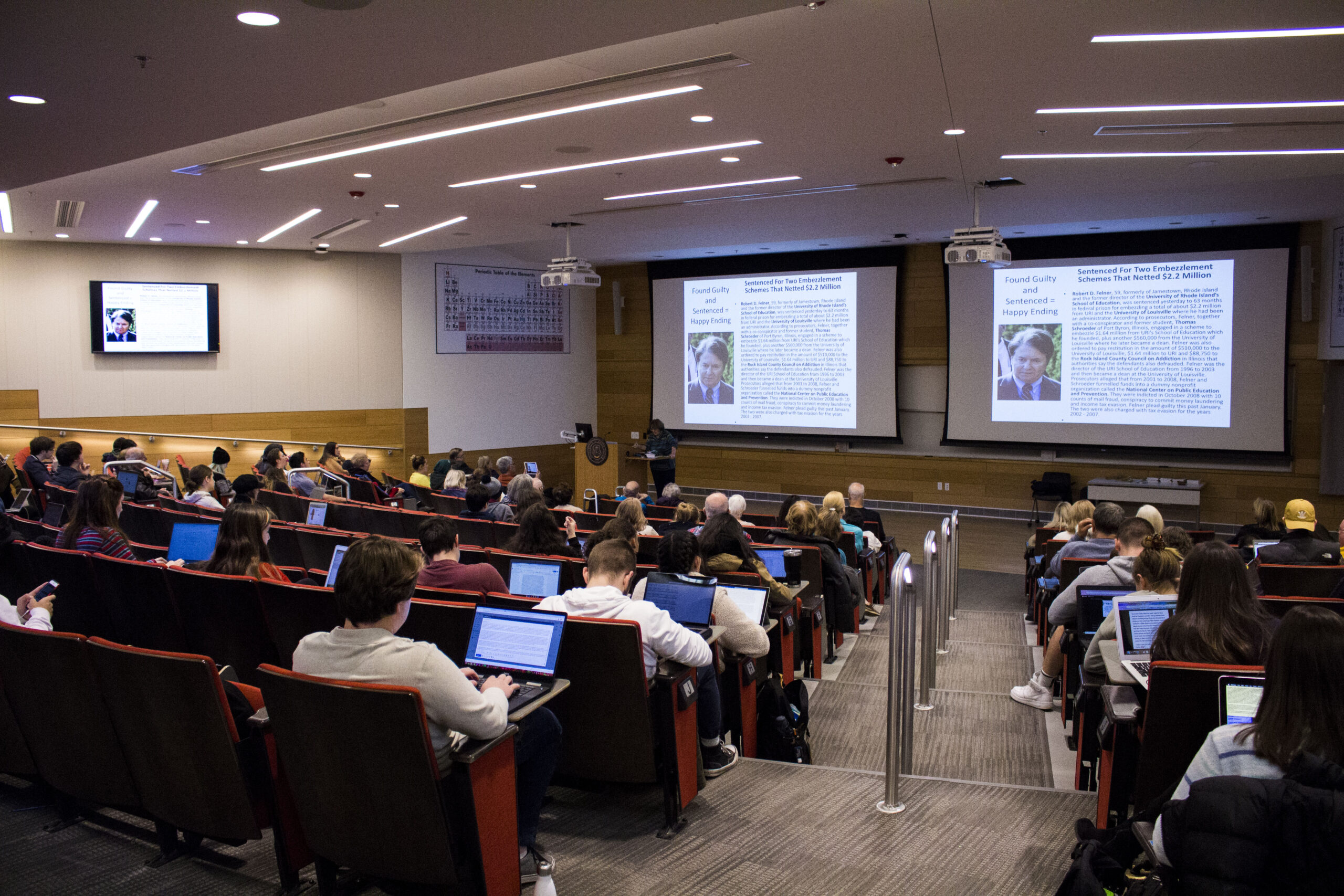With more COVID-19 vaccinations received every day, the University hopes to make a return to in-person classes by the fall semester. Photo by James McIntosh.
Officials from the University of Rhode Island’s Health Services, Housing and Residential Life (HRL) and Dining Services recently released their preliminary plans for the fall 2021 semester.
This year, the University has worked to combat COVID-19 by following the Rhode Island Department of Health’s (RIDOH) guidance as well as recommendations from the Center for Disease Control. This adherence will continue next academic year, according to Director of Health Services Ellen Reynolds.
Reynolds said that if the University is given the chance to vaccinate students, Health Services will immediately take up the offer. She is optimistic that the rollout of vaccinations in Rhode Island will encourage a return to normalcy at URI in the fall, although she believes that only time can tell the fate of many campus initiatives.
“[RIDOH] was originally saying that students could get vaccines mid-summer, but now we are hearing maybe late May,” she said. “If we could get [vaccines], even in the second week of May, we could get them into students before they left. If we are allowed to vaccinate our own students, that’s what we would like to do.”
Safety is the highest priority when considering plans for the fall, according to Reynolds and Jennifer Hodshon, the associate director of Health Services.
In terms of concrete plans for next semester, some decisions remain undecided. Reynolds said that as time goes on, university officials will learn more about which activities will be permitted and which restrictions will remain in place. Right now, Reynolds and Hodshon are confident that outdoor activities will take place but believe that mask-wearing will still be mandated in most cases.
Testing requirements for the fall are also still to be determined, but students will learn more about COVID-19 testing procedures as time goes on, according to Reynolds. She hopes that by September, testing will only be necessary for symptomatic students.
Health Services will continue to work with RIDOH as the virus evolves. Reynolds stressed the importance of students receiving the vaccine and abiding by COVID-19 restrictions so that campus can return to normal as quickly as possible.
“It’s hard to imagine that we will be 100 percent back to normal,” she said. “I think it will be somewhere in between, and we are hoping that students will receive their vaccines this summer.”
Some operations created during the pandemic are likely to remain on campus, such as telehealth and teletherapy, as well as elongated move-in periods. Reynolds believes that these are two positives that URI has gained from the pandemic.
HRL released a statement last week indicating that all double rooms are intended to be used as such for the fall semester, instead of being made into triples as they have in the past. According to the email released by Frankie Minor, assistant vice president and director of HRL, this means that many current resident students may be displaced next year.
Reynolds was unsure of how HRL decided who will receive housing priorities, but she said that double occupancy rooms are the best option for URI moving forward.
“Based on what we experienced this previous fall, doubles will not pose a problem for us,” she said. “We haven’t seen a great spread on campus, and so we feel comfortable that even if the virus is still around, we could manage doubles.”
Dining Services Director Pierre St-Germain said that there have been multiple levels to planning and that the dining staff is bracing themselves for the future.
He said that Dining Services intends to have more freedom for students next semester, such as allowing students to eat their meals in the dining halls again and authorizing new ways for students to receive their meals. However, some things may never be the same for Dining Services.
“I think that service won’t ever be quite the same because some things will change moving forward,” St-Germain said. “I doubt that our self-serve buffets will exist, at least not for the next several years.”
St-Germain and his team have made innovative steps towards a new service system for students to receive food safely to deal with these challenges. Mobile ordering for all dining locations has been discussed within dining services, which would allow students to customize their meals and select pick-up or dine-in arrangements.
St-Germain described all the preliminary plans as a “work in progress”. He at least hopes to give students a wider variety of meals and eating accommodations in the fall.
This past year, students have exclusively used disposable plates, cups, and utensils for their meals, but St-Germain is optimistic that they will return to sustainable options soon.
“I’d really like for students to be able to dine with us and use regular plates,” he said. “It would make for a better dining experience. Having to revert to pre-packaged items for just about everything creates a lot of waste going to the landfill.”
Between Health Services, HRL and Dining Services, there are still many decisions to be made as the virus regresses. Administrators remain hopeful that the best is yet to come for URI in the fall and beyond.





